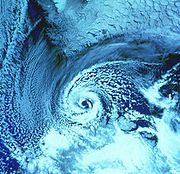By Jonathan Amos
Science reporter, BBC News, San Francisco
Scientists in the US have presented one of the most dramatic forecasts yet for the disappearance of Arctic sea ice.
Their latest modelling studies indicate northern polar waters could be ice-free in summers within just 5-6 years.
Professor Wieslaw Maslowski told an American Geophysical Union meeting that previous projections had underestimated the processes now driving ice loss.
Summer melting this year reduced the ice cover to 4.13 million sq km, the smallest ever extent in modern times.
Remarkably, this stunning low point was not even incorporated into the model runs of Professor Maslowski and his team, which used data sets from 1979 to 2004 to constrain their future projections.
"Our projection of 2013 for the removal of ice in summer is not accounting for the last two minima, in 2005 and 2007," the researcher from the Naval Postgraduate School, Monterey, California, explained to the BBC.
"So given that fact, you can argue that may be our projection of 2013 is already too conservative."
Real world
Using supercomputers to crunch through possible future outcomes has become a standard part of climate science in recent years.
Professor Maslowski's group, which includes co-workers at Nasa and the Institute of Oceanology, Polish Academy of Sciences (PAS), is well known for producing modelled dates that are in advance of other teams.
These other teams have variously produced dates for an open summer ocean that, broadly speaking, go out from about 2040 to 2100.
But the Monterey researcher believes these models have seriously underestimated some key melting processes. In particular, Professor Maslowski is adamant that models need to incorporate more realistic representations of the way warm water is moving into the Arctic basin from the Pacific and Atlantic oceans.
"My claim is that the global climate models underestimate the amount of heat delivered to the sea ice by oceanic advection," Professor Maslowski said.
"The reason is that their low spatial resolution actually limits them from seeing important detailed factors.
"We use a high-resolution regional model for the Arctic Ocean and sea ice forced with realistic atmospheric data. This way, we get much more realistic forcing, from above by the atmosphere and from the bottom by the ocean."
The Intergovernmental Panel on Climate Change (IPCC), the UN-led body which assesses the state of the Earth's climate system, uses an averaged group of models to forecast ice loss in the Arctic.
But it is has become apparent in recent years that the real, observed rate of summer ice melting is now starting to run well ahead of the models.
The minimum ice extent reached in September 2007 shattered the previous record for ice withdrawal set in 2005, of 5.32 million square km.
The long-term average minimum, based on data from 1979 to 2000, is 6.74 million square km. In comparison, 2007 was lower by 2.61 million square km, an area approximately equal to the size of Alaska and Texas combined, or the size of 10 United Kingdoms.
Diminishing returns
Professor Peter Wadhams from Cambridge University, UK, is an expert on Arctic ice. He has used sonar data collected by Royal Navy submarines to show that the volume loss is outstripping even area withdrawal, which is in agreement with the model result of Professor Maslowski.
"Some models have not been taking proper account of the physical processes that go on," he commented.
"The ice is thinning faster than it is shrinking; and some modellers have been assuming the ice was a rather thick slab.
"Wieslaw's model is more efficient because it works with data and it takes account of processes that happen internally in the ice."
He cited the ice-albedo feedback effect in which open water receives more solar radiation, which in turn leads to additional warming and further melting.
Professor Wadhams said the Arctic was now being set up for further ice loss in the coming years.
"The implication is that this is not a cycle, not just a fluctuation. The loss this year will precondition the ice for the same thing to happen again next year, only worse.
"There will be even more opening up, even more absorption and even more melting.
"In the end, it will just melt away quite suddenly. It might not be as early as 2013 but it will be soon, much earlier than 2040."
The US National Snow and Ice Data Center (NSIDC) collects the observational data on the extent of Arctic sea ice, delivering regular status bulletins. Its research scientist Dr Mark Serreze was asked to give one of the main lectures here at this year's AGU Fall Meeting.
Discussing the possibility for an open Arctic ocean in summer months, he told the meeting: "A few years ago even I was thinking 2050, 2070, out beyond the year 2100, because that's what our models were telling us. But as we've seen, the models aren't fast enough right now; we are losing ice at a much more rapid rate.
"My thinking on this is that 2030 is not an unreasonable date to be thinking of, and yet Dr Maslowski has the view that it may be as early as 2013. He's on the record now. We'll see how that pans out."
Former US Vice President Al Gore cited Professor Maslowski's analysis on Monday in his acceptance speech at the Nobel Peace Prize ceremony in Oslo.
http://news.bbc.co.uk/2/hi/science/nature/7139797.stm
What really caught my eye - "So given that fact, you can argue that may be our projection of 2013 is already too conservative."




